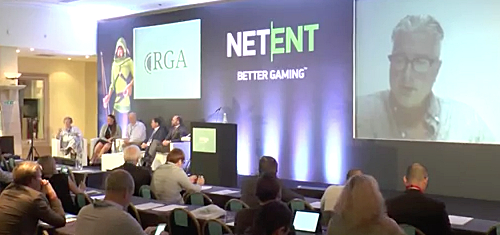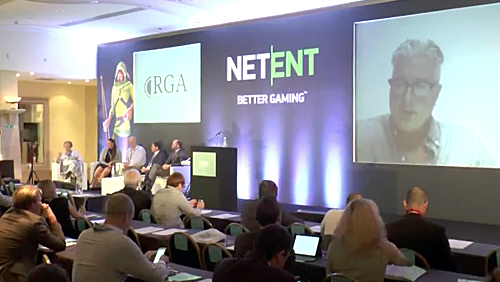 Calvin Ayre made his promised appearance at the Malta iGaming Seminar on Tuesday, appearing via Skype on a panel dubbed “A Century of iGaming.”
Calvin Ayre made his promised appearance at the Malta iGaming Seminar on Tuesday, appearing via Skype on a panel dubbed “A Century of iGaming.”
Led by moderator Sue Schneider, the panel also featured Sportingbet’s Mark Blandford, Novomatic’s Franz Wohlfahrt, Pinnacle Sports’ Paris Smith and Betsson’s Pontus Lindwall. The panelists looked back and compared how online gambling began, the reality it currently occupies and its future prospects. (Full video viewable at the bottom of this page.)
Asked about their frustrations during the industry’s early days, Calvin cited his main concern was figuring out “how to make it work.” Blandford groaned over his attempts at getting banks to process transactions for online betting sites. Blandford said the mere mention of internet gambling and credit cards in the same sentence was likely to get you thrown out of a bank while “the coffee was still warm.”
Smith also cited payment processing and regulations as major frustrations due to the “disparity of the understanding of the industry.” Smith noted the early days involved “every week getting a new Western Union provider.” But she said the company had ultimately learned to view frustrations as opportunities, as each crisis forces you to be creative and innovative to find a way out.
BEST, WORST DECISIONS
Asked about the best decision they’d made, Blandford cited the Pardise Poker website’s addition of a tiny button labeled ‘blackjack,’ which he said all on its own boosted the site’s revenue by 35%. Blandford deadpanned that “you don’t find that kind of free money all that often.”
Calvin said his best opportunity came from his decision to get into the market early, as the cost of entry has since skyrocketed and continues to rise. But Calvin said his best decision came during the early part of the last decade, when he broke from the herd by not seeking a public listing for Bodog, the online gambling company he oversaw until stepping back from an active role in the industry nearly a decade ago.
Asked what one thing they would have done differently, virtually all the panelists expressed regrets that they hadn’t invested more in technology. Blandford in particular lamented the fact that Sportingbet’s intellectual property was limited to its brand.
Smith said she would have liked a better understanding of the Asian and European markets before Pinnacle planted its flag. Smith said Asia in particular was a “huge eye-opener,” in that “just because you have something that worked in America, it doesn’t always work everywhere else in the world.”
LOOKING AHEAD
Blandford revealed that he was backing an incubator focused on blockchain technology. Calvin also believes this technology will spur innovation in the gaming industry, but unlike Blandford, Calvin views blockchain as only part of the puzzle.
Calvin’s view is that blockchains don’t work without the presence of the Bitcoin token. “Gamification of the Bitcoin token and the way that they’re using the hashes to create the trust mathematically is what makes that technology work … Centralization through blockchain technology is going to create basically just another big database that we’ve got already.”
Calvin suggested that cryptocurrencies like Bitcoin would “return some power back to the consumer,” as most consumers “don’t need as much protection as governments say they need.”
Calvin also predicted that some combination of eSports and virtual reality would ‘fundamentally shift” the gaming industry. This tech combo would result in innovations “uniquely developed for the internet” and force the industry to shed its reliance on “hundred-year-old games distributed over the internet.”
(Mobile users having difficulty loading the video can access it via YouTube here.)
